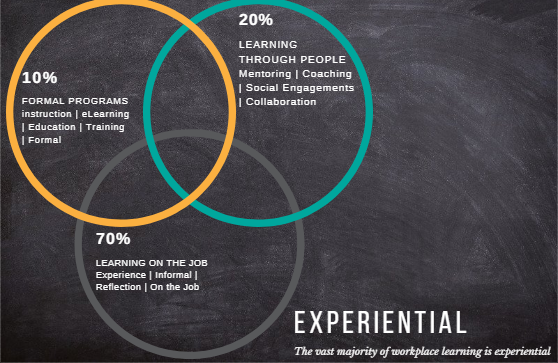
By Steve Catania
What’s the 20%?
Imagine starting a new job. Typically, the first thing your employer has you do is complete new employee paperwork, read the company handbook, or fill out employee benefits applications. Depending on your organization, you may also be required to complete some sort of formal training. We discussed the concept of formal training in June’s HR CoP newsletter.
So, what do you do with the information you acquire in your formal learning? How do you learn about what you need to do for your job that isn’t provided in the formal learning?
The 20% of the 70/20/10 model consists of social learning, coaching, mentoring, and collaborative learning. Putting this concept into our house-building case study, the model could look like: watching and learning from the foreman how to cut rafter angles or asking an experienced colleague to provide feedback on your blueprint sketches.
At UW–Madison, the 20% relates to our role of (human resource professionals or managers) because we work at a complex and decentralized campus where each college, school, or division has different business processes and policies. For employees in the learning role, which is all of us, it is important to ask questions and seek out opportunities to learn from those with different experiences in this complex environment. This is especially true as engagement and inclusion are at the forefront of our work – being open to other’s perspectives takes practice and allows you to recognize and honor the diverse backgrounds, advice, and skills of colleagues.
If you are in a mentor role, you play an integral part in the learning process. Not every topic can or should be taught in a formal setting. As a result, you must share knowledge, provide guidance, and help your colleagues to make informed decisions so that they can be successful in their roles. As a mentor, you also benefit from helping to foster inclusive relationships, while also improving your skills in interpreting policies and business processes.
As you continue to acquire and develop your knowledge and expertise, take time to consider what your role is in the learning process and how you can contribute to your department and colleagues. Options include:
- Participating in an HR Communities of Practice
- Attending a networking event with other HR professionals/managers in the Madison area
- Discussing ideas with colleagues to solve a problem in your work unit